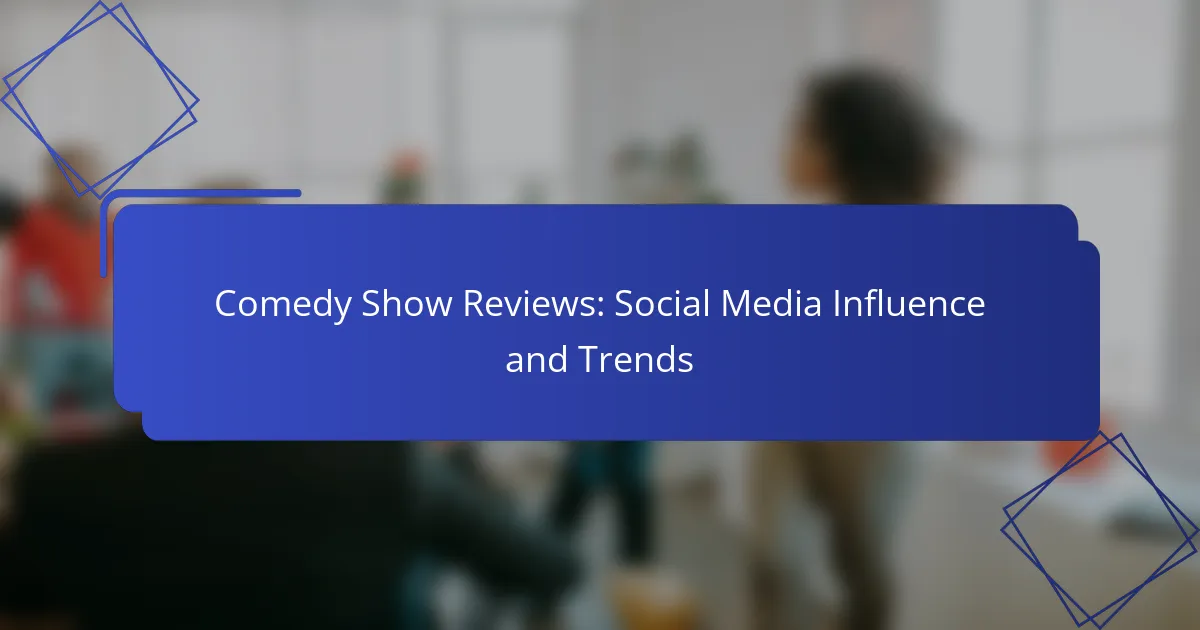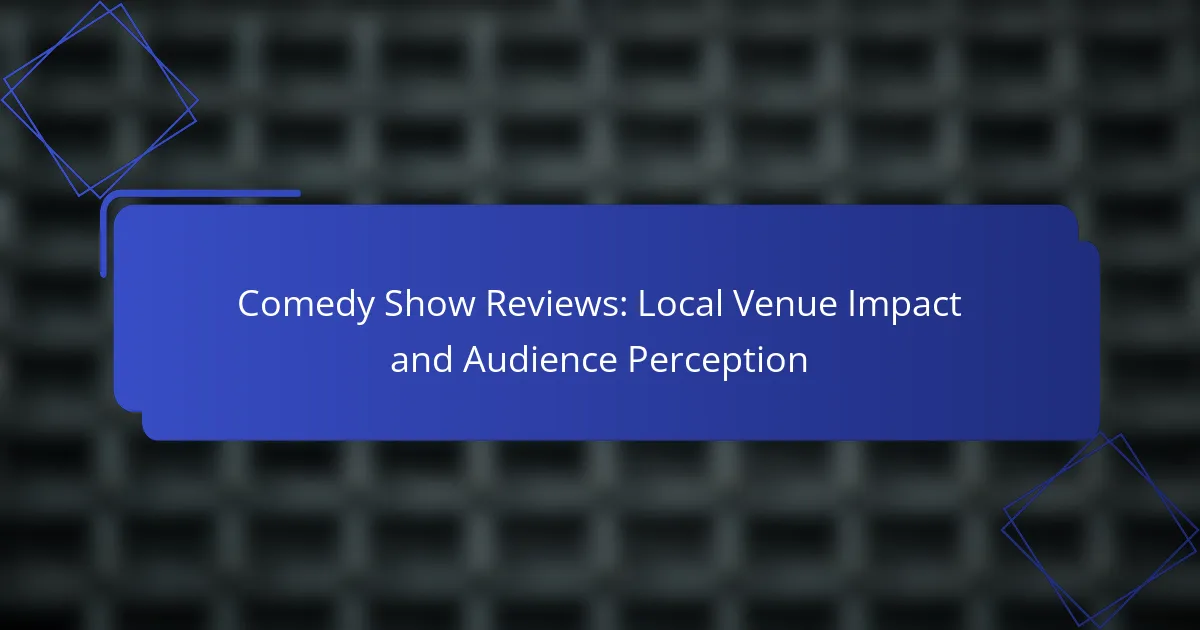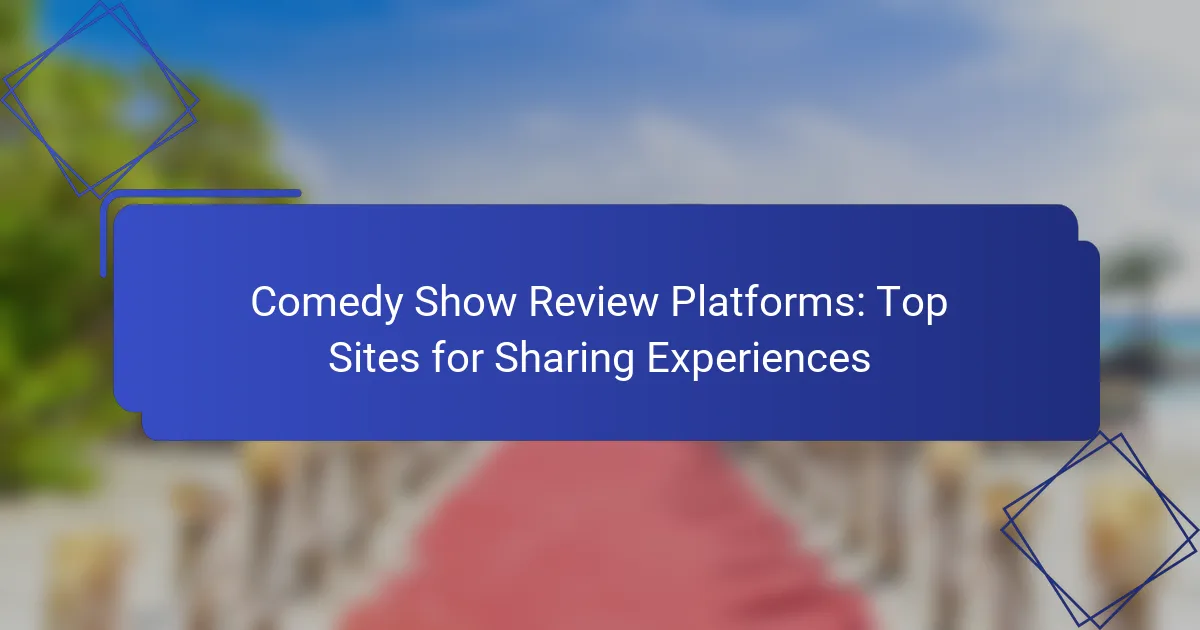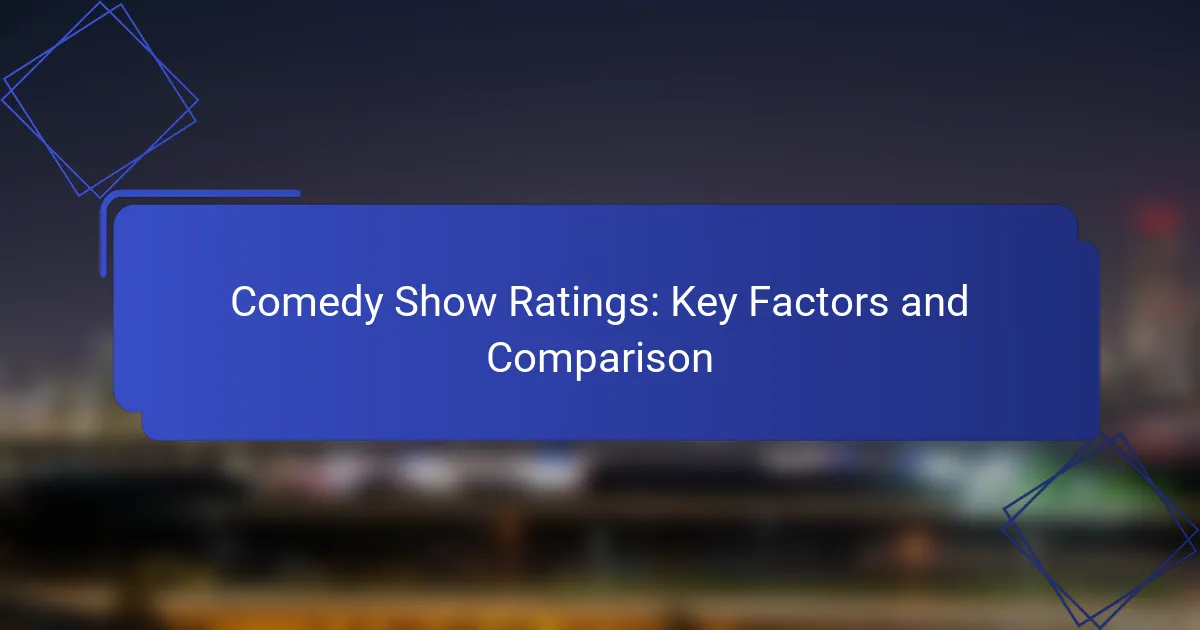In today’s digital age, social media plays a crucial role in shaping the landscape of comedy show reviews, influencing audience perceptions and facilitating real-time interactions. Platforms like Twitter and Instagram not only allow fans to voice their opinions but also impact public sentiment and future viewership trends. As comedy shows increasingly harness these platforms, they create engaging content that fosters community and anticipation, reflecting a diverse range of comedic styles and audience engagement.
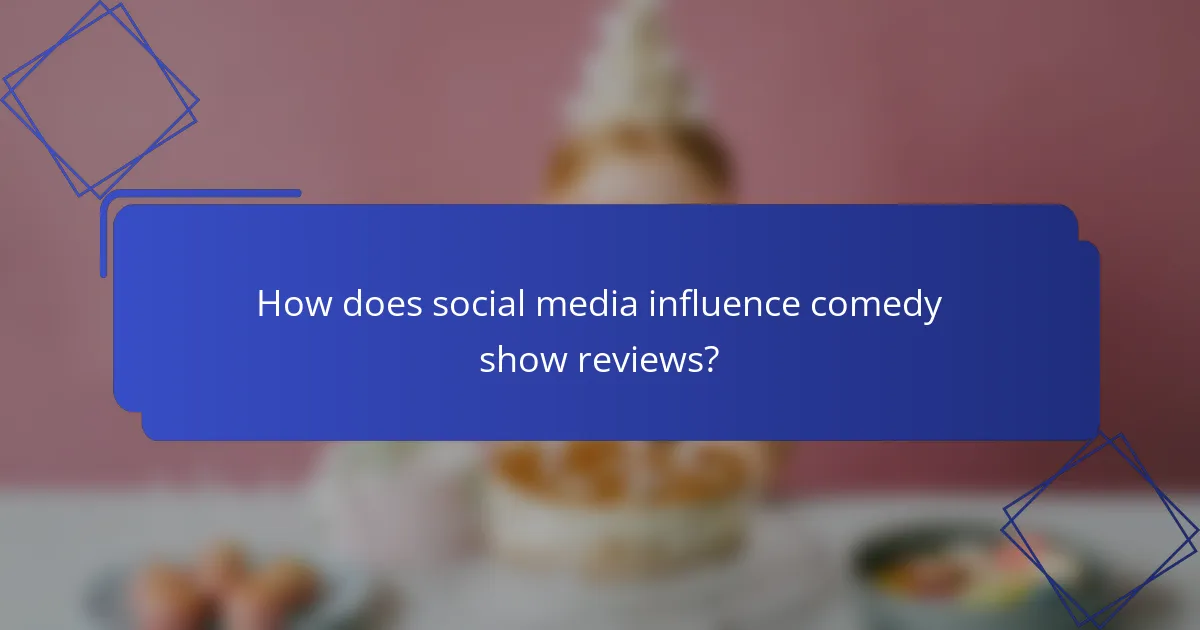
How does social media influence comedy show reviews?
Social media significantly impacts comedy show reviews by shaping audience perceptions and facilitating immediate interactions. Platforms like Twitter, Instagram, and Facebook allow fans to share their thoughts, which can sway public opinion and influence future viewership.
Increased audience engagement
Social media fosters heightened audience engagement by providing a platform for fans to express their opinions and connect with others. Comedians often use these platforms to interact with their audience, share behind-the-scenes content, and promote upcoming shows, creating a sense of community.
This engagement can lead to increased ticket sales and viewership, as fans are more likely to attend shows when they feel a personal connection to the performers. For example, a comedian who actively engages with fans on social media may see a spike in attendance compared to one who does not.
Real-time feedback mechanisms
Real-time feedback mechanisms on social media allow audiences to share their reactions instantly during or after a comedy show. This immediate feedback can be invaluable for comedians and producers, as they can gauge audience reactions and adjust their performances or marketing strategies accordingly.
For instance, a comedian might notice a particular joke resonating well through positive comments and shares, prompting them to incorporate it more frequently in their set. Conversely, negative feedback can help them identify material that may need revision or removal.
Viral marketing strategies
Viral marketing strategies leverage social media to amplify the reach of comedy shows through shareable content. Clips, memes, and quotes from performances can quickly spread across platforms, attracting new audiences who may not have been aware of the show otherwise.
Successful viral campaigns often involve creating relatable or humorous content that encourages sharing. For example, a short, funny clip from a stand-up routine that resonates with viewers can lead to widespread sharing, significantly boosting the show’s visibility and ticket sales.
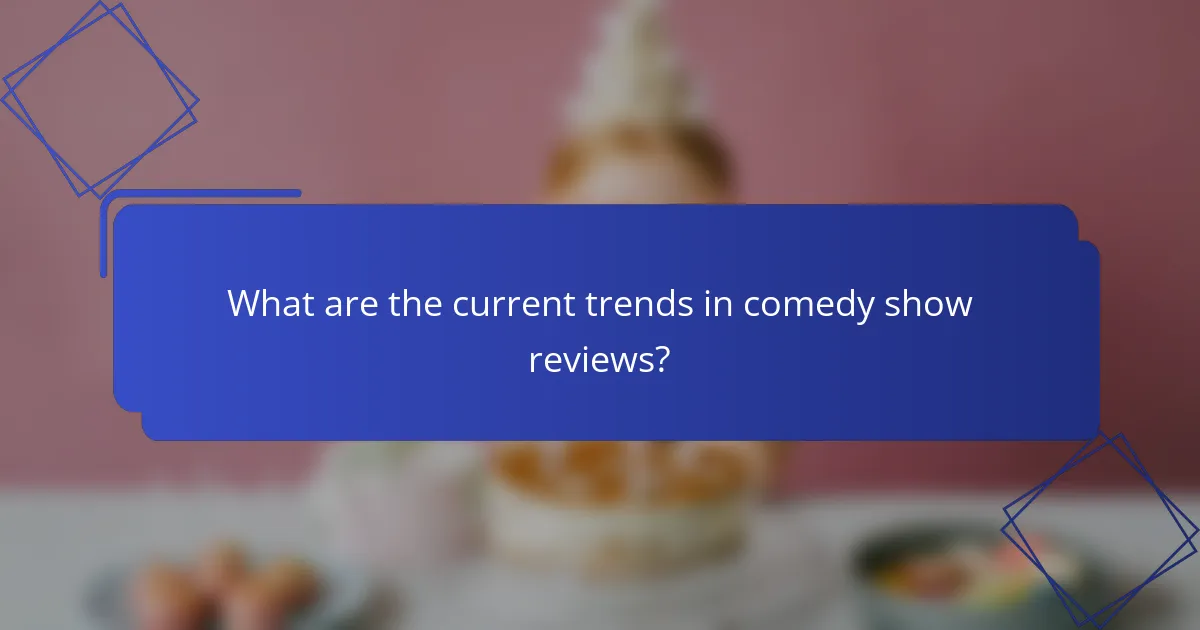
What are the current trends in comedy show reviews?
Current trends in comedy show reviews highlight the growing influence of social media and audience engagement. Reviews are increasingly shaped by influencers, user-generated content, and a broader representation of comedic styles.
Rise of influencer reviews
Influencer reviews have become a significant force in shaping public perception of comedy shows. Influencers often have large followings and can sway opinions through their personal experiences and recommendations. This trend encourages comedians to engage with influencers for promotional purposes, leading to increased visibility and ticket sales.
Comedians and production companies should consider collaborating with influencers who align with their brand. This can involve hosting special events or providing exclusive content to influencers, which can amplify reach and enhance credibility among potential audiences.
Integration of user-generated content
User-generated content is increasingly prevalent in comedy show reviews, with audiences sharing their thoughts on platforms like Twitter, Instagram, and TikTok. This trend allows for a more authentic representation of audience reactions, as fans post videos, memes, and comments that reflect their experiences. Such content can often go viral, further promoting the show.
To leverage user-generated content, comedians and promoters should encourage fans to share their experiences online. Creating specific hashtags or challenges can motivate audiences to participate, providing a rich source of organic promotion that resonates with potential viewers.
Focus on diverse comedic styles
The focus on diverse comedic styles is reshaping the landscape of comedy show reviews. Audiences are increasingly seeking out performances that reflect a variety of cultural backgrounds and comedic approaches. This trend not only broadens the appeal of comedy but also fosters inclusivity within the industry.
Comedians should embrace diverse styles and narratives in their performances to connect with wider audiences. Reviews that highlight this diversity can attract attention from various demographic groups, enhancing overall engagement and ticket sales. Promoters can also curate lineups that feature a mix of comedic voices to cater to this growing demand.
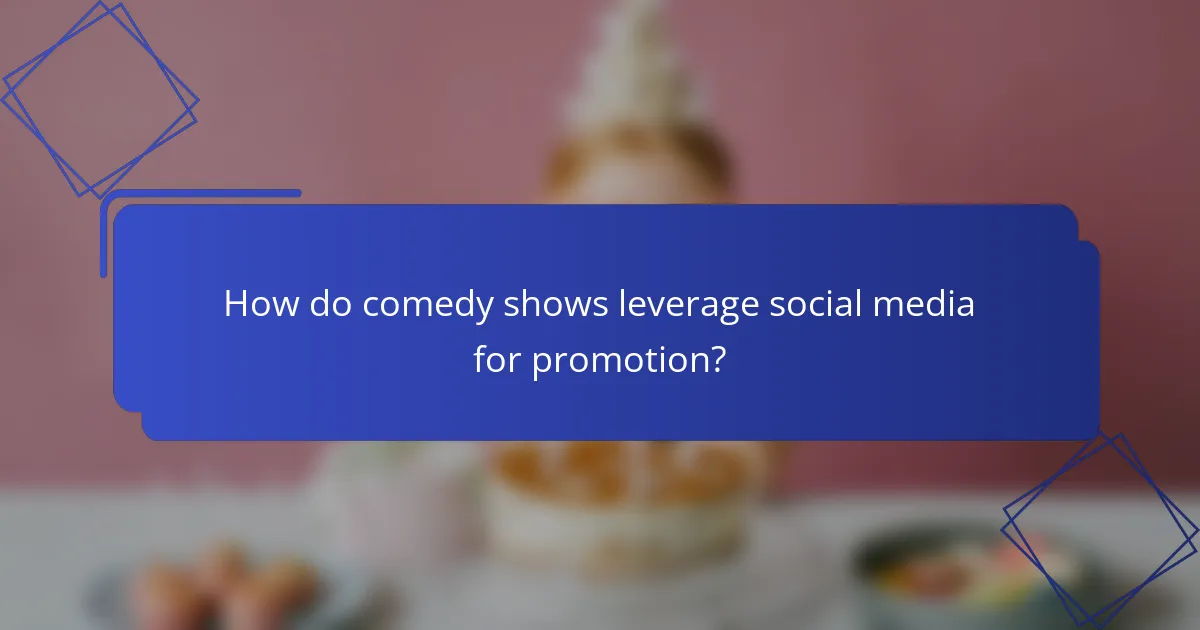
How do comedy shows leverage social media for promotion?
Comedy shows utilize social media to enhance visibility and engage audiences through targeted strategies. By creating compelling content and fostering interaction, they effectively build anticipation and community around their performances.
Targeted advertising campaigns
Comedy shows often employ targeted advertising campaigns on platforms like Facebook and Instagram to reach specific demographics. By using audience insights, they can tailor ads based on interests, location, and behaviors, ensuring that promotional content reaches potential fans effectively.
For instance, a comedy show in New York might focus its ads on users aged 18-35 who have shown interest in stand-up comedy or local entertainment. This precision helps maximize ad spend and increases ticket sales.
Interactive content strategies
Interactive content strategies, such as polls, quizzes, and live Q&A sessions, engage audiences and create a buzz around comedy shows. These tactics encourage fans to participate actively, fostering a sense of community and investment in the event.
For example, a comedian might post a poll asking followers to vote on which material they prefer for an upcoming show. This not only generates excitement but also gives fans a stake in the performance, enhancing their likelihood of attending.
Partnerships with social media platforms
Comedy shows often form partnerships with social media platforms to enhance their promotional reach. Collaborations can include sponsored content, exclusive live-streamed events, or special features that highlight the show on the platform.
Such partnerships can significantly boost visibility; for instance, a comedy special might be promoted through Instagram Stories or TikTok challenges, tapping into the platforms’ vast user bases to attract new audiences.
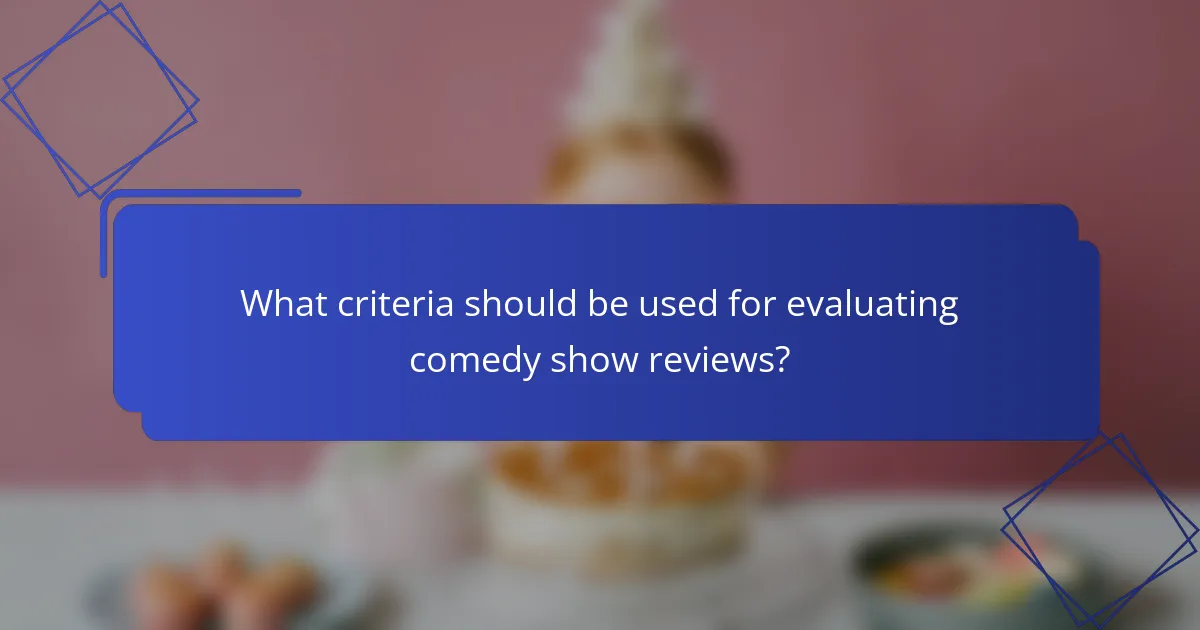
What criteria should be used for evaluating comedy show reviews?
Evaluating comedy show reviews requires a focus on content originality, audience reception metrics, and reviewer credibility. These criteria help determine the quality and impact of a comedy performance, guiding potential viewers in their choices.
Content originality
Content originality refers to the uniqueness of the material presented in a comedy show. A review should assess whether the comedian offers fresh perspectives or relies on clichés and overused jokes. Original content often resonates more with audiences and can lead to a more memorable experience.
To evaluate originality, consider the themes and topics covered in the performance. For example, a show that tackles current social issues with humor may be seen as more original than one that recycles traditional punchlines. Look for innovative storytelling techniques or unexpected twists in familiar setups.
Audience reception metrics
Audience reception metrics involve analyzing how well the comedy show is received by its viewers. This can include ticket sales, social media engagement, and audience feedback through platforms like Twitter or Instagram. High engagement levels often indicate that the material resonates with the audience.
When evaluating these metrics, consider both quantitative data, such as the number of likes or shares, and qualitative feedback, like comments or reviews. A show that garners a strong positive response across various platforms is likely to be more enjoyable and impactful.
Reviewer credibility
Reviewer credibility is crucial in assessing the reliability of a comedy show review. A credible reviewer typically has a background in comedy or entertainment criticism, providing insights that are informed and valuable. Their experience can enhance the review’s authority and trustworthiness.
To gauge a reviewer’s credibility, examine their previous work and expertise. Look for reviews from established critics or platforms known for their entertainment coverage. Be cautious of reviews from unknown sources or those lacking in-depth analysis, as they may not provide an accurate representation of the show’s quality.
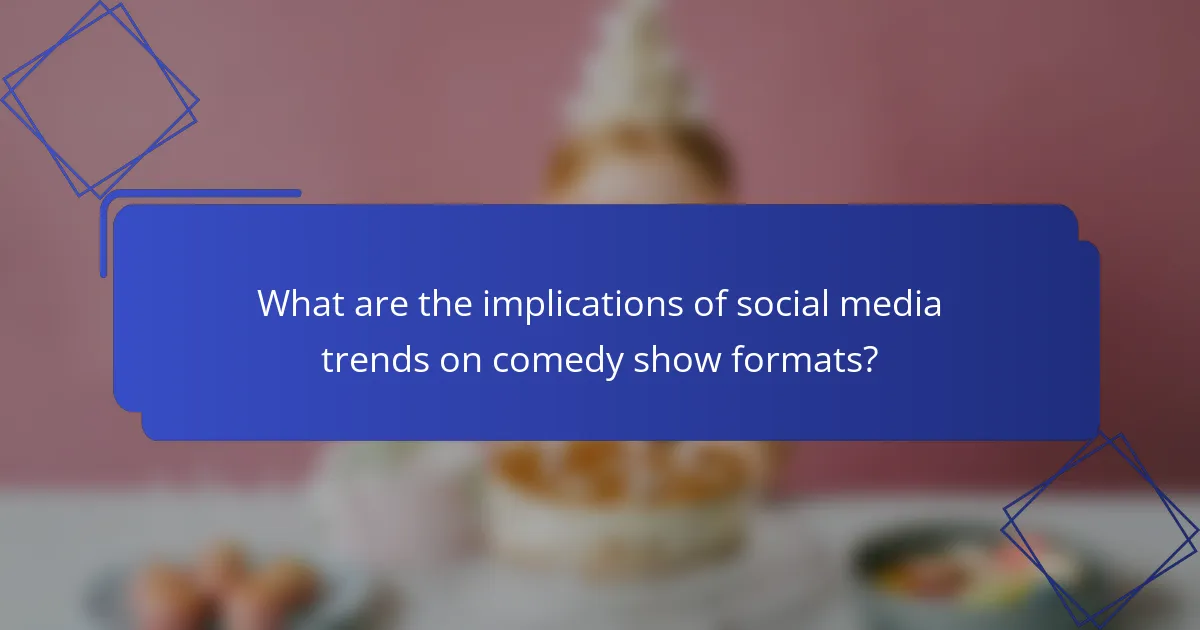
What are the implications of social media trends on comedy show formats?
Social media trends significantly shape comedy show formats by influencing content delivery, audience engagement, and overall production style. As platforms evolve, comedians and producers adapt to capture viewer attention and maintain relevance.
Short-form content popularity
Short-form content, such as clips and memes, has surged in popularity due to platforms like TikTok and Instagram. Comedy shows are increasingly incorporating bite-sized segments to cater to audiences with shorter attention spans, often resulting in more frequent, humorous snippets that can go viral.
For instance, traditional comedy sketches may be condensed into 30-second clips, allowing for rapid sharing and engagement. This shift encourages comedians to focus on punchy, impactful jokes that resonate quickly with viewers.
Increased audience participation
Social media allows for greater audience participation in comedy shows, transforming passive viewers into active contributors. Comedians often solicit jokes, comments, or reactions from their followers, creating a more interactive experience.
This engagement can take the form of live polls during shows or requests for audience-submitted content, which can be integrated into performances. Such strategies not only enhance viewer connection but also provide comedians with fresh material directly from their fanbase.
Adaptation to viewer feedback
Comedians and producers are increasingly responsive to viewer feedback gathered through social media. Instant reactions and comments allow creators to gauge audience preferences and adjust content accordingly, ensuring that shows remain relevant and entertaining.
This adaptability can lead to changes in comedic style, topics, or even the format of the show itself. For example, if a particular joke or character receives positive feedback, it may be expanded in future episodes, while less popular elements can be phased out quickly.
